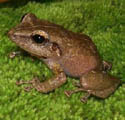Testing a Potential Biological Control for Invasive Puerto Rican Coqui Frogs in Hawaii
Puerto Rican Coqui frogs (Eleutherodactylus coqui) have been introduced in Hawaii and are now considered invasive. Current control methods are limited to habitat alteration and inspection of ornamental plant shipments to prevent inter-island spread of these frogs. Coquis have extremely loud breeding calls -- so loud that they greatly reduce the sale value of infested properties. Hawaiian homeowners use a variety of methods to try to control these frogs, including spraying bleach or citric acid to try to kill them. However, there are no native amphibians in Hawaii, so a biological control might be used without fear of impacts on native species. One candidate biological control is the nematode parasite Rhabdias elegans. This parasite is found in Coquis in their native range, but not in frogs in Hawaii. The objectives of this project were to:
1) Isolate parasites from frogs collected in
Puerto Rico,
2) Infect frogs collected in Hawaii with the parasites,
3) Evaluate growth and survival of infected vs. control frogs, and
4) Evaluate performance of infected vs. control frogs.
This research was conducted by Dr. Steve Johnson and Monica McGarrity and Shenandoah Marr and Dr. Arnold Hara, researchers from the University of Hawaii at Hilo. The results of this study showed that this parasite has some limited potential as a biological control for invasive Coqui frogs in Hawaii, and may warrant further study. The published results of this work are available below.
- Marr, S.R., Johnson, S.A., Hara, A.R., and McGarrity, M.E. 2010 Preliminary Evaluation of the Potential of the Helminth Parasite Rhabdias elegans as a Biological Control Agent for Invasive Puerto Rican Coquís (Eleutherodactylus coqui) in Hawaii (444 KB pdf). Biological Control 54: 69-74.
Combating Coqui in the Laboratory
(Hawaii Public Radio - Aired: July 2010)
The coqui frog is destructive to both ecosystems and housing
values. Research from the Big Island shows that home prices are
directly affected by the presence of coqui--which can be especially
noisy at night. We've recently covered eradication efforts on the
North Shore of Maui. Hawaii Public Radio's Ben Markus follows up with a report on
researchers who are also waging a battle against the coqui in the lab.
Click to listen (Length: 2:33)
